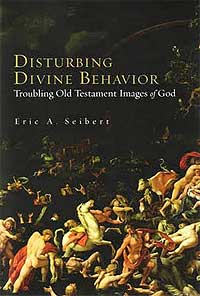As a follow up to my last post, I wanted to put a plug in for a recently published book that also explores the difficult issue of the violent portrayal of God in the Hebrew Bible/Old Testament — a book which I am using as one of the texts for one of the courses I am teaching next semester:
 Disturbing Divine Behavior:
Disturbing Divine Behavior:
Troubling Old Testament Images of God
by Eric A. Seibert
Fortress Press, 2009
Buy from Amazon.ca | Amazon.com
In this work Seibert examines the disturbing narrative portrayals of God in the Hebrew Bible and explores some ways in which we may (as Christians) read these narratives in a responsible and faithful manner today. I am not necessarily convinced by Seibert’s solution to the problem, but he does a great job focusing the issue and helping us understand the function of biblical narrative and its relation to history. I only wish that he would have expanded his coverage to at least include the negative images of God found in the prophetic literature. Moreover, I really wish he expanded his work to cover the entire Christian Bible (Old and New Testaments), so the issue isn’t even framed as an “Angry God of the Old Testament versus the Loving God of the New Testament” debate.
Another book that deals with the same problem by focusing on the book of Joshua and the conquest/Canaanite genocide is Walter Brueggemann‘s recently published, Divine Presence Amid Violence: Contextualizing the Book of Joshua (Cascade, 2009; Buy from Amazon.ca | Amazon.com).

Check out my blog for a brief review/critique of Seibert’s volume. At bottom, I find his methodology and assumptions quite problematic (and not that novel).
I’d be curious as to your thoughts. Please do weigh in there (I would cite the link here explicitly, but I don’t want to advertise so blatantly).
The whole “Angry God of the Old Testament versus the Loving God of the New Testament” debate seems quite mistaken to me. When, on rare occasions, I have taught intro to the New Testament I flip the dynamic around. I think the loving and caring God of the Hebrew Bible gives way to a more angry and vengeful God in the New Testament. After all, I don’t see YHWH dishing out eternal damnation or sending souls to Hades.
I totally agree Jim, especially if you compare the apocalyptic visions of Revelation.
I will have to look at your review John. For those who want to take a gander at it, click here.
Thanks, Tyler. It isn’t a full-scale review but more of a challenge to one particular aspect (though the central aspect!) of Seibert’s volume.
It is refreshing to have concentrated, serious, explicit, widespread scholarly attention given to this topic.
Probably we can attribute the awakening to this issue to the publicity of the “New Atheists.”
Pingback: clayboy » Biblical Studies Carnival XLVIII
Am I the only one struck by the embarrassing oddity of Paul in 1st Cor. exclaiming that “many of you are sick and some have fallen asleep” as God’s judgment for improper celebration of the Lord’s supper? Paul explained many illnesses and even some untimely deaths in terms of God’s judgment on Christians who didn’t honor the Lord properly? That sounds extremely superstitious to me, and even a sign that preachers early one were attempting to wield control via implanting fears. Same goes for the married couple both struck dead for lying to Peter, and Paul’s anathemas and exiling people from the church “to hand them over to Satan” if they didn’t believe as Paul did.